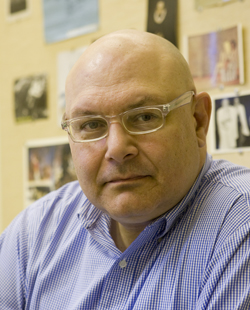English's Venuti translates overlooked role into scholarly success
Paul W. Eberman Faculty Research Award
| Lawrence Venuti, professor of English, is an internationally renowned translator and translation theorist. His two most important explorations of the cultural role of translation, The Translator’s Invisibility (1995) and The Scandals of Translation (1998) are credited with transforming the conversation about translation in the U.S. and around the globe.
Those contributions are among many that have led to Venuti’s selection as the 2009 Paul W. Eberman Faculty Research Award winner. “As one of his field’s leading theorists, Professor Venuti’s critical work has shifted the very goals of translation,” said Shannon Miller, professor and chair of the English Department in Temple’s College of Liberal Arts. Traditionally, a fluent translation aimed to carry a text effortlessly from one culture to another, completely erasing distinctions. For Venuti, however, that effect conceals the inevitable loss and gain in the translating process. He theorizes that the translator must call attention to this transformation through his interpretive moves, even through the very choice of a text to translate. |
 Photo by Joseph V. Labolito/Temple University
Venuti
|
|
|
|
|
“Rather than covering up the transformation, the translator’s practice should be highlighted and the cultural differences of the foreign text should be somehow registered in the translation,” Venuti said. A Temple alumnus (CLA ’74) and grandchild of Italian working-class immigrants, Venuti grew up in South Philadelphia, absorbing the rhythms of the Italian language spoken around him. He studied Latin and French at St. Joseph’s College Preparatory High School, but didn’t study Italian, the language he is now most well known for translating, until he was a doctoral candidate in English at Columbia University. While “playing hooky” from his dissertation, Venuti would read in Italian everything from Dante to Calvino. Later, as a young assistant professor teaching classes in 17th-century literature at Temple, he found that the success he had achieved by that point as the translator of five books was not recognized in the academy. “It’s gratifying to receive this award today — and not a little ironic. In 1983, when I came up for mid-term review, the vote was eight to seven to renew my contract,” Venuti said. “Translation almost cost me my job.” As a result, writing and thinking theoretically about translation became a mission. “I began to see translation as an interpretive act that should be interrogated,” he said. The winner of many awards, including a Guggenheim Fellowship and most recently the Robert Fagles Translation Prize, Venuti has translated everything from 19th-century prose by a neglected author of Gothic tales to canonical modern novelists to controversial contemporary best-sellers. Some of his translations are credited with improving the literary reputations of the original authors, in one case raising the author’s status to literary stardom. The stylistic experiments that Venuti enacts within his translations have been called “elegant” and “brilliant” by reviewers. Because of his national and international reputation, he has been invited to teach translation workshops at Princeton, the University of Pennsylvania and Columbia. “My next project will look at how these theories and practices can contribute to other fields that involve translation, like film adaptation, museum exhibition and perhaps even translational research in medicine,” said Venuti. |